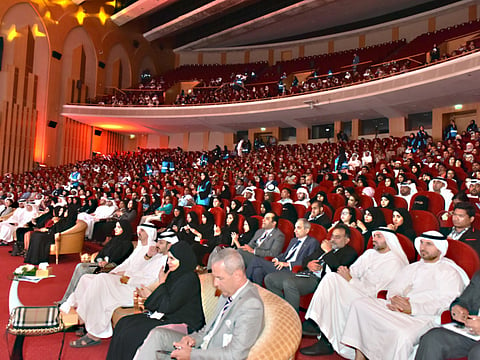Over 1,200 attend organ donation campaign
Abu Dhabi organises session to familiarise people with UAE laws and procedures on organ transplants

Abu Dhabi: Sara Al Raisi says she received the best gift in the world last December.
The 33-year-old Emirati was found to be the best kidney match for her ailing father, Juma Al Raisi, and she donated her kidney to give the 66-year-old a new lease of life.
“Organ donation is one of the biggest gifts you can give to a patient. But even for the donor, it is such a blessing to be able to save a life. Now that I’ve become a donor while alive, I would be more than happy to save even more lives as a deceased donor, if the chance ever arose,” the software engineer told Gulf News.
Al Raisi was speaking on the sidelines of an organ donation awareness session in the capital on Tuesday. The session was attended by more than 1,200 residents.
The meeting was one of the largest recorded organ donation awareness sessions in the world, and it familiarised attendees with the UAE’s current rules and regulations regarding organ donation. The event was organised by the emirate’s public health provider, Abu Dhabi Health Services Company (Seha), and included a detailed address from Dr Ali Al Obaidli, chairman of the UAE’s National Transplant Committee.
Organ donation in UAE
The UAE passed its first law on organ transplantation in 1993. Under this regulation, transplants were allowed between living donors who were related. This meant that only kidneys and parts of the liver could legally be transplanted in the country, as organs like the heart and lungs can only be acquired from brain-dead persons. For years, the Shaikh Khalifa Medical City, a public health care facility in the capital, was the only authorised organ transplantation centre. It still runs the country’s largest organ transplant programme.
In 2013, the UAE saw its first organ transplantation from a deceased donor, after health, legal and religious authorities worked to agree upon a definition of brain death.
In September 2016, the legal framework for deceased donor transplants was strengthened when UAE President His Highness Shaikh Khalifa Bin Zayed Al Nahyan issued a new law to authorise such transplants. This marked the UAE’s acceptance of the Gulf-wide medically agreed-upon definition of brain death, and it was put into effect in March 2017.
The UAE currently has four certified centres for organ transplantation: the Shaikh Khalifa Medical City, the Cleveland Clinic Abu Dhabi, the Mediclinic City Hospital Dubai and Al Jalila Children’s Specialty Hospital. Among them, the Celveland Clinic Abu Dhabi is the only multi-organ transplant centre, having successfully performed successful transplantation of four solid organs, including the kidneys, the heart, the liver and the lungs as of February 2018.
A countrywide donor registry has not yet been established, however, and residents who want to donate their organs upon brain death must still convey their wishes to family members, and in turn, they must communicate this to medical authorities.
What attendees say
“I’m healthy, I exercise and eat well. So I think I would be a good organ donor. I also saw my grandmother suffer from end-stage renal disease for years, so I would be happy to become an organ donor. This is why I’m attending today’s session — to learn more about the UAE’s laws on the subject,” said Cassandra Matienzo, a 29-year-old nurse from the Philippines.
Abdul Rahman Al Beloushi, 19, an Emirati medical student, said he wants to be able to give the unwell a second chance at life.
“I recently lost my newborn nephew, and it’s only driven home the fact that life is a real blessing. I would like to be able to share it with those in need, and would only be happy to become either a living or deceased organ donor,” he added.



